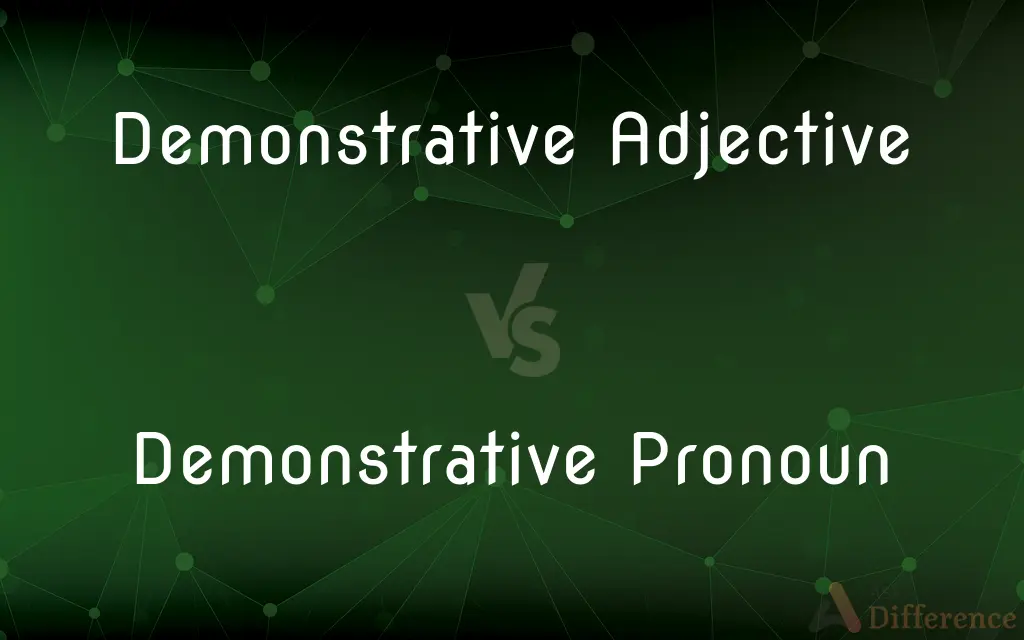Demonstrative Adjective vs. Demonstrative Pronoun — What's the Difference?
Edited by Tayyaba Rehman — By Fiza Rafique — Published on December 11, 2023
A Demonstrative Adjective describes a noun (e.g., "this car"), while a Demonstrative Pronoun stands in for a noun (e.g., "this is mine").

Difference Between Demonstrative Adjective and Demonstrative Pronoun
Table of Contents
ADVERTISEMENT
Key Differences
A Demonstrative Adjective works closely with a noun, serving to point out or highlight it. Conversely, a Demonstrative Pronoun replaces a specific noun, allowing us to avoid redundancy in speech or writing.
Examples of Demonstrative Adjectives include "this," "that," "these," and "those" when they appear right before nouns, as in "this book" or "those shoes." On the other hand, when "this" or "those" stand alone representing the noun, they function as Demonstrative Pronouns as in "this is beautiful" or "those were the days."
While a Demonstrative Adjective always needs a noun to modify, a Demonstrative Pronoun stands on its own, representing a noun that's either explicitly mentioned earlier in the text or contextually understood.
In terms of utility, Demonstrative Adjectives help in providing clarity, ensuring the reader or listener understands precisely which noun the speaker is referencing. In contrast, Demonstrative Pronouns assist in making conversations and writing more concise, eliminating the need to continually repeat the noun.
It's essential to differentiate between the two because while both Demonstrative Adjectives and Demonstrative Pronouns can utilize the same words, their roles in a sentence are different. The former describes a noun, while the latter replaces it.
ADVERTISEMENT
Comparison Chart
Function in Sentence
Describes a noun.
Replaces a noun.
Requires a Following Noun
Yes.
No.
Examples
This car, those books.
This is mine, those are hers.
Purpose
Provides specificity.
Avoids redundancy.
Position in Sentence
Immediately before the noun it modifies.
Can stand alone.
Compare with Definitions
Demonstrative Adjective
Used to distinguish items in terms of proximity.
Hand me those scissors.
Demonstrative Pronoun
A word that stands in for a specific noun.
This is the one I wanted.
Demonstrative Adjective
Highlights a particular noun in context.
That movie was intense.
Demonstrative Pronoun
Can represent both objects and people.
Those are the culprits.
Demonstrative Adjective
A word that specifies and modifies a noun.
I love this song.
Demonstrative Pronoun
Eliminates the need for repetition in sentences.
I prefer this over that.
Demonstrative Adjective
Directs attention to a specific noun.
This restaurant has amazing reviews.
Demonstrative Pronoun
Refers back to a noun previously mentioned.
I have two cats; this is friendly, but that is shy.
Demonstrative Adjective
Can be singular or plural in form.
These apples are fresh.
Demonstrative Pronoun
Can be used to indicate items near or far.
These are my glasses, but where are those?
Common Curiosities
Can "this" serve as both Demonstrative Adjective and Demonstrative Pronoun?
Yes, depending on its use in a sentence: "this book" (adjective) vs. "this is mine" (pronoun).
What's the main function of a Demonstrative Adjective?
A Demonstrative Adjective modifies and specifies a noun.
Can "these" be a Demonstrative Adjective?
Yes, when it modifies a noun, like in "these shoes."
In "I like this one better than that," are both "this" and "that" Demonstrative Pronouns?
Yes, both words stand in for specific nouns.
Is "those" in "I want those" a Demonstrative Pronoun?
Yes, because it stands alone without a noun following it.
Can Demonstratives indicate distance?
Yes, "this" and "these" often indicate closeness, while "that" and "those" suggest further away.
Are there only four main Demonstratives in English?
Yes, "this," "that," "these," and "those" are the primary Demonstratives.
Does a Demonstrative Pronoun always replace a noun?
Yes, it stands in for a specific noun, making sentences more concise.
Can Demonstratives refer to abstract ideas?
Yes, as in "I don't want to discuss this," where "this" can refer to an idea or situation.
Why are Demonstrative Pronouns important in conversation?
They prevent redundancy and make speech more fluid and concise.
What's the primary difference between a Demonstrative Adjective and Demonstrative Pronoun?
A Demonstrative Adjective modifies a noun, while a Demonstrative Pronoun replaces it.
In "I saw that movie," is "that" a Demonstrative Adjective?
Yes, because it modifies the noun "movie."
Is it crucial to determine the difference between Demonstrative Adjective and Demonstrative Pronoun?
Yes, as their functions differ, understanding them ensures correct sentence structure.
Do Demonstrative Pronouns only replace singular nouns?
No, they can replace both singular ("this" and "that") and plural ("these" and "those") nouns.
Can a Demonstrative Adjective stand alone in a sentence?
No, it always needs a noun to modify.
Share Your Discovery

Previous Comparison
Que vs. Line
Next Comparison
Grains vs. CerealsAuthor Spotlight
Written by
Fiza RafiqueFiza Rafique is a skilled content writer at AskDifference.com, where she meticulously refines and enhances written pieces. Drawing from her vast editorial expertise, Fiza ensures clarity, accuracy, and precision in every article. Passionate about language, she continually seeks to elevate the quality of content for readers worldwide.
Edited by
Tayyaba RehmanTayyaba Rehman is a distinguished writer, currently serving as a primary contributor to askdifference.com. As a researcher in semantics and etymology, Tayyaba's passion for the complexity of languages and their distinctions has found a perfect home on the platform. Tayyaba delves into the intricacies of language, distinguishing between commonly confused words and phrases, thereby providing clarity for readers worldwide.
















































